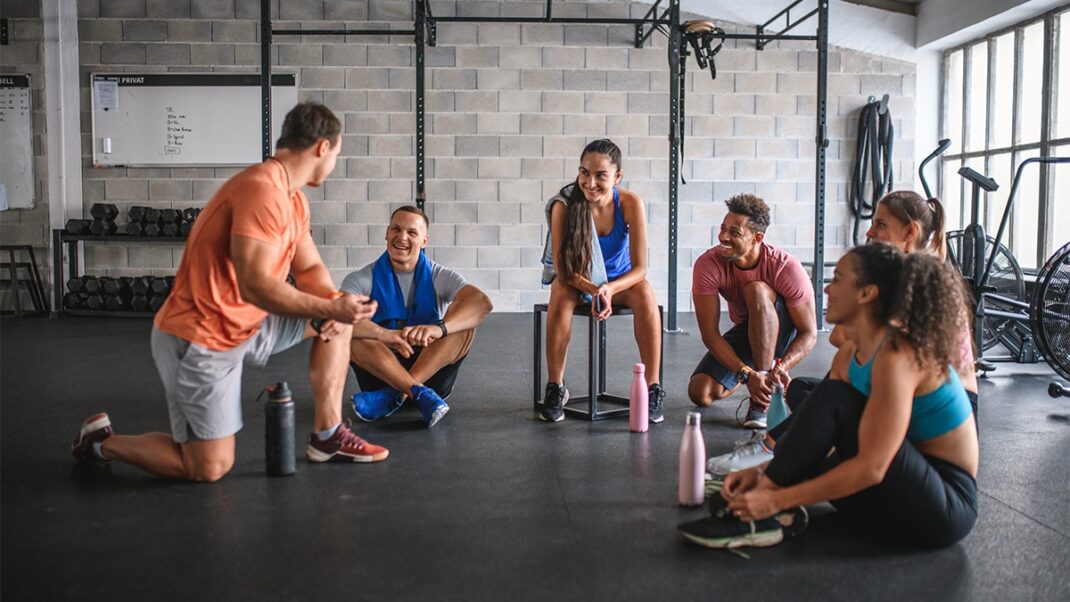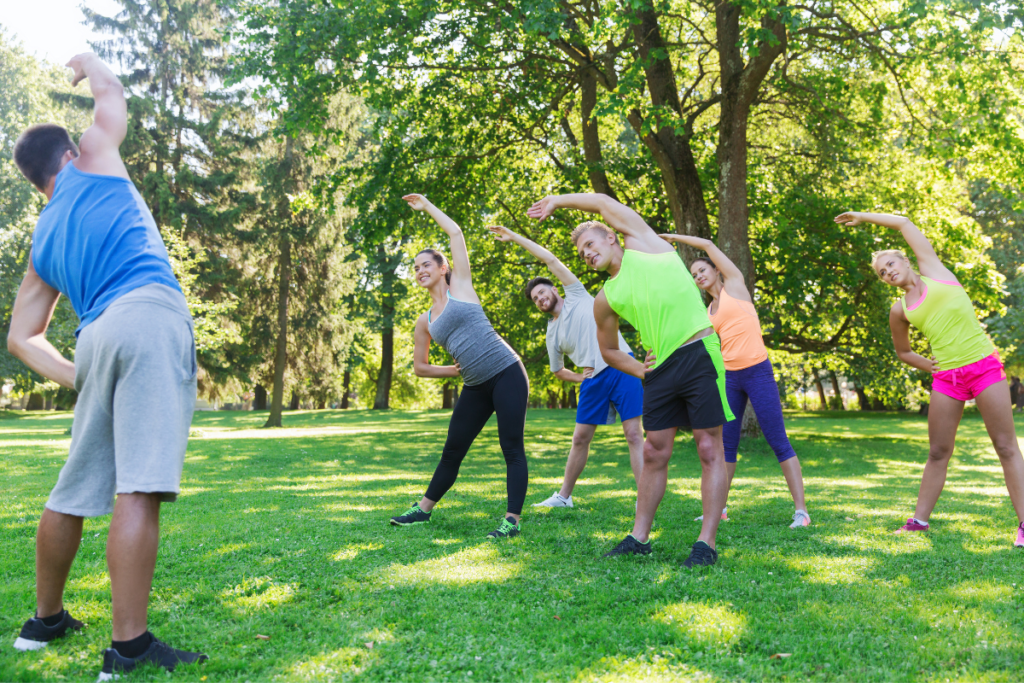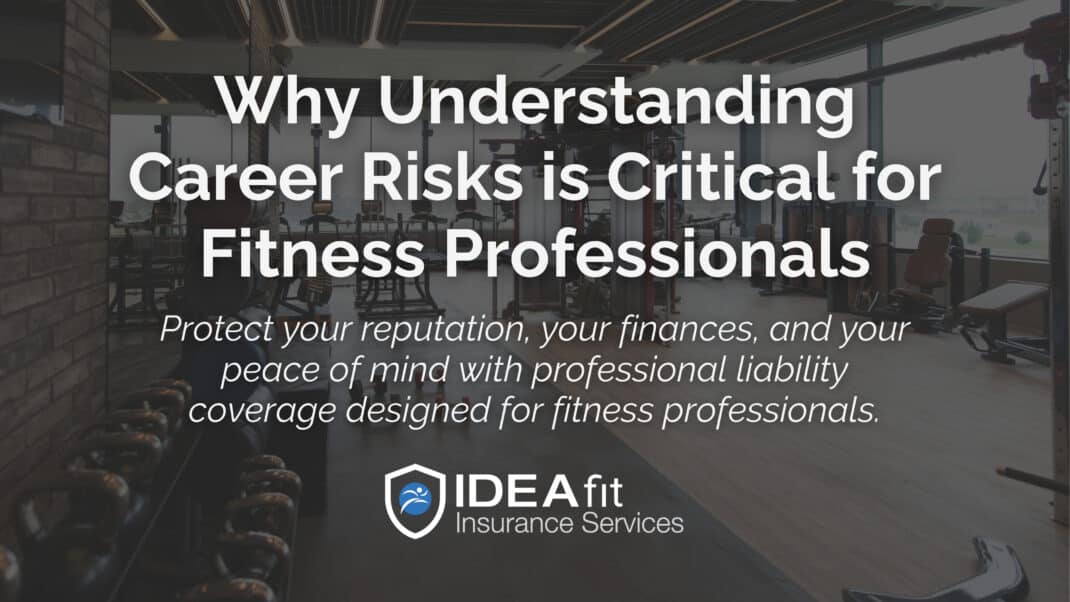Forge a Successful Fitness Career with Internships
Obtaining hands-on, real-world experience from a mentored program is a wise investment.

The job outlook for personal trainers, fitness instructors, and group exercise professionals remains strong. According to the U.S. Bureau of Labor Statistics (BLS), employment for fitness trainers and instructors is projected to grow 14 percent between 2023 and 2033, which is much faster than the average for all occupations (BLS, 2024a). As of May 2024, the median annual wage for these professionals is $46,180, which equals about $22.20 per hour (BLS, 2024a).
The demand for fitness professionals is being fueled by rising awareness of the health risks associated with sedentary lifestyles, the increasing prevalence of chronic conditions, and the aging of the Baby Boomer generation. Facilities and clients alike are prioritizing trained fitness staff who can deliver safe, personalized programs that improve overall quality of life. Analysts project roughly 57,800 new personal trainer positions by 2033, alongside an estimated 75,000 annual job openings, many of which stem from industry growth and replacement needs (BLS, 2024a). For motivated fitness professionals, this is an ideal time to enter the field or expand into leadership and specialty roles.
Why Internships Still Make the Difference
Certifications provide essential knowledge, but hands-on experience is what makes a professional competitive. Internships supply the real-world context that helps new and established fitness trainers refine their skills and build confidence. They offer opportunities to interact with clients, learn how to modify programming for different populations, and develop a deeper understanding of industry dynamics. These experiences can help professionals transition smoothly into careers while reducing the common trial-and-error phase.
Internships also allow professionals to identify their unique strengths and preferences within the industry. A trainer may discover a passion for corrective exercise, while another may find that small-group training is more rewarding. Through mentorship and applied practice, interns build professional networks that often lead to job offers or collaborative partnerships. In a competitive marketplace, employers are more likely to hire trainers who demonstrate not just textbook knowledge but also practical competence gained through supervised training experiences (American Council on Exercise [ACE], 2023).
Internships offer real-world training, mentorship, and exposure to client management, specialized programming, and business operations. Whether you’re:
- Newly certified,
- Transitioning from another industry, or
- An experienced trainer looking to specialize or move into management…
A well-chosen internship can fast‑track your professional development and career trajectory.
What You Can Gain
- Practical client-handling and programming experience
- Networking with industry mentors and potential employers
- Confidence in executing live sessions and programs
- Insights into specialty areas like corrective exercise, youth fitness, senior fitness, or studio operations
Types of Internship Programs Today
Unpaid internships are often best for newly certified trainers who need opportunities to observe and apply their skills. These roles typically involve shadowing experienced trainers, completing administrative tasks, and practicing client engagement in a supportive environment. While unpaid, they provide valuable networking opportunities and often lead to mentorship relationships that support long-term career growth. For those balancing limited finances at the beginning of their careers, unpaid internships can also be less demanding in time commitment, allowing for part-time work elsewhere.
Paid or tuition-based internships provide structured, intensive learning with direct access to industry leaders. These programs are especially appealing to fitness professionals who want to specialize in corrective exercise, youth training, senior fitness, or management. Paid internships often come with a curriculum designed to deliver specific career outcomes and may provide access to job placement support. They also tend to foster a deeper commitment from both interns and mentors, since the investment signals seriousness about professional development (National Academy of Sports Medicine [NASM], 2024).
Increasingly, internships now extend into remote and hybrid coaching models. Many facilities and online platforms offer opportunities for trainers to gain experience delivering programs through mobile apps, live streaming, or pre-recorded content. Internships in digital fitness expose professionals to emerging technologies such as AI-driven workout personalization and wearable integration, both of which are shaping client expectations. Hybrid models, which blend in-person and online coaching, have become the standard in many gyms and studios, making it critical for trainers to build competency in both delivery modes (World Health Organization [WHO], 2023; McKinsey & Company, 2023).
Choosing the Right Program for Your Goals
The first step in selecting an internship is clarifying your career vision. If your goal is to work with older adults, for example, you may want to find a program that provides exposure to age-specific training techniques and safety protocols. On the other hand, if your career goal is to open a studio, an internship with a business development focus will provide essential knowledge of sales, operations, and marketing. Aligning internships with long-term goals ensures that the time and resources invested translate into concrete progress.
In addition, trainers should assess both strengths and weaknesses before committing to a program. A professional who is skilled in motivation and client relationships but struggles with sales might select an internship emphasizing business development. Conversely, a trainer who has strong technical skills but lacks confidence in leading large groups could benefit from a program focused on group fitness instruction. By considering both personal development needs and larger industry opportunities, professionals can make informed decisions that advance their careers (IDEA Health & Fitness Association, 2024).
Interns should also consider where technology fits into their career trajectory. With the digital fitness market projected to surpass $80 billion globally by 2030 (Statista, 2024), programs that offer exposure to hybrid and online models can provide a significant competitive advantage. For example, an aspiring personal trainer may choose an internship with a company specializing in app-based coaching, while an experienced instructor might pursue a hybrid group-training mentorship to refine both digital and in-person class delivery.
Step-by-Step Guide
1. Clarify Your Career Vision
Where are you now, and where do you want to be in 2–5 years? Are you aiming to:
- Build a one-on-one client roster?
- Launch group classes or boutique studios?
- Specialize (e.g., pre/postnatal, older adults, corrective exercise)?
- Move into operations, management, or business ownership?
2. Assess Your Strengths & Gaps
- What skills or experience qualities set you apart? (e.g., motivational coaching, program design, sales)
- Where are you less confident? (e.g., client attraction, business management, advanced movement assessment)
3. Tap into Industry Trends
Current opportunity areas include:
- Corrective and functional movement training
- Aging population/senior fitness
- Youth and teens fitness due to rising health concerns
- Online coaching & hybrid/virtual training models
- Group training formats like small-group personal training
These specializations are driven by broader health trends and evolving consumer demand.
4. Consider Local Competition & Niche Demand
If you’re a yoga instructor in an area saturated with generic classes, consider an internship in Pilates or corrective movement to differentiate. Likewise, if your market lacks senior-focused trainers, upskilling in that niche could be highly profitable.
Crafting Your Internship Strategy
Developing a strategy for selecting internships involves identifying short- and long-term career needs. For example, a new trainer may realize they lack marketing and client-acquisition skills. Choosing an internship that emphasizes these areas provides immediate value and builds a foundation for future independence as a business owner. Similarly, a veteran group instructor might seek a corrective exercise internship to broaden their skill set and increase client retention through individualized services.
Another way to approach this decision is to evaluate local market conditions. Trainers can analyze gaps in services offered by competitors and then select internships that provide expertise in those underserved areas. For instance, if a market is saturated with high-intensity interval training classes but lacks prenatal or postnatal fitness offerings, a trainer who invests in specialized training and internships in that niche may quickly establish themselves as a go-to professional. This strategy creates a competitive advantage while aligning professional growth with community needs (ACSM, 2024).
Interns should also factor in the rapid expansion of online coaching platforms and hybrid wellness programs. Many clients now expect flexible options, such as digital workout libraries, on-demand classes, or virtual accountability sessions. Choosing an internship that integrates these tools can ensure trainers are not left behind as the industry shifts. In practice, this might mean working with a studio that offers a hybrid membership model or an app-based fitness company that supplements in-person training with digital tracking and coaching. These experiences prepare fitness professionals for the realities of a blended marketplace (McKinsey & Company, 2023).
Immediate Application
Let’s say you’re a new trainer, aiming to open your own weight-loss studio in three years:
- You’ve lost 50 lbs yourself, teaching you empathy and weight-loss coaching.
- You lack sales/business skills and worry about online competition.
Internship plan:
- Seek an unpaid, hands-on mentorship in a local fitness facility that trains weight-loss clients.
- Commit 3–4 hours weekly over 3–4 months, assisting with client sessions, sales strategy, and studio operations.
- Use this to improve business acumen, refine marketing skills, and build referral networks.
How to Land the Right Internship
Finding the right internship requires proactive research and networking. Trainers should investigate programs offered by local gyms, health clubs, and universities, as well as opportunities through national fitness organizations. Many organizations require specific certifications, background checks, or liability insurance, so it is important to prepare these essentials in advance. Once prerequisites are met, candidates should submit a professional resume and a personalized letter that clearly communicates goals, skills, and the value they can bring to the internship program.
Making a strong impression is critical, since many internships are competitive. Applicants can differentiate themselves by creating short video introductions, attending industry conferences, or connecting with mentors on professional networking platforms. Demonstrating initiative, professionalism, and enthusiasm helps build rapport and makes it more likely that applicants are chosen. Ultimately, the ability to articulate both what you hope to learn and how you plan to contribute makes you a stronger candidate (ACE, 2023).
- Research providers: Look for mentors with proven results, certifications, or business success.
- Check prerequisites: Certifications, insurance, liability waivers, or background checks may be required.
- Make a strong pitch: Submit a tailored resume and cover letter—consider a brief video showcasing your passion and goals.
- Demonstrate initiative and goals: Share why you’re interested in their niche, what you want to learn, and how you can contribute.
- Follow up professionally: Respectfully reiterate your interest and ask about the next steps.
Your professionalism and sincere interest can make a huge impression—especially in competitive programs.
The health and fitness industry continues to grow and evolve, with personal training projected to remain one of the fastest-growing professions in the coming decade. Internships represent an essential step toward bridging the gap between certification and long-term success. They provide practical experience, mentorship, and the confidence needed to excel in this dynamic field. Whether unpaid or paid, internships offer opportunities to specialize, expand professional networks, and cultivate the skills required to thrive.
By clarifying career goals, recognizing strengths and weaknesses, and aligning with industry trends, fitness professionals can maximize the return on their internship investment. With a projected 14 percent job growth rate and a median salary above $46,000, the opportunities are plentiful for those willing to take initiative and invest in hands-on training experiences (BLS, 2024a).
References
American College of Sports Medicine. (2024). Worldwide survey of fitness trends for 2024. ACSM’s Health & Fitness Journal, 28(1), 19–30. https://doi.org/10.1249/FIT.0000000000000875
American Council on Exercise. (2023). The importance of internships and mentorships for fitness professionals. ACE Fitness. https://www.acefitness.org
Bureau of Labor Statistics. (2024a). Fitness trainers and instructors: Occupational outlook handbook. U.S. Department of Labor. https://www.bls.gov/ooh/personal-care-and-service/fitness-trainers-and-instructors.htm
IDEA Health & Fitness Association. (2024). Fitness trends report 2024. IDEA Health & Fitness Association. https://www.ideafit.com
National Academy of Sports Medicine. (2024). Personal training career guide: Internships and specializations. NASM. https://www.nasm.org
References
American College of Sports Medicine. (2024). Worldwide survey of fitness trends for 2024. ACSM’s Health & Fitness Journal, 28(1), 19–30. https://doi.org/10.1249/FIT.0000000000000875
American Council on Exercise. (2023). The importance of internships and mentorships for fitness professionals. ACE Fitness. https://www.acefitness.org
Bureau of Labor Statistics. (2024a). Fitness trainers and instructors: Occupational outlook handbook. U.S. Department of Labor. https://www.bls.gov/ooh/personal-care-and-service/fitness-trainers-and-instructors.htm
IDEA Health & Fitness Association. (2024). Fitness trends report 2024. IDEA Health & Fitness Association. https://www.ideafit.com
National Academy of Sports Medicine. (2024). Personal training career guide: Internships and specializations. NASM. https://www.nasm.org


